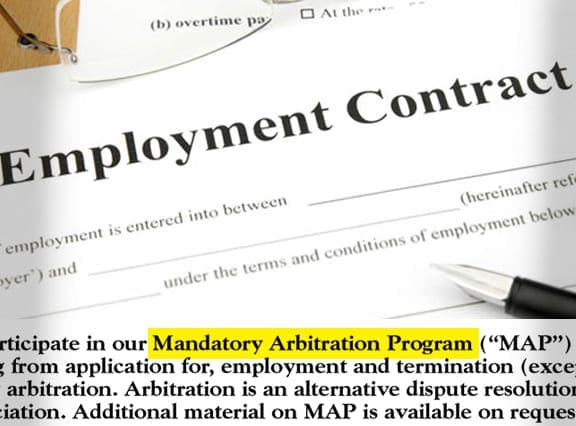Last year, when Fox News did not renew the contract of television commentator and anchor Gretchen Carlson, she filed a lawsuit against the network’s then chairman Roger Ailes, insisting that she was fired because of her refusal to submit to his sexual advances and not because of disappointing ratings as he and the network claimed. Within several months, Ailes, who has since died, was ousted as chairman as several more women came forward and a culture of inappropriate behavior toward women was exposed that also led to the ouster of popular host Bill O’Reilly.
Carlson could have been forced to keep silent because she had signed an agreement with Fox News to settle any employment disputes with the network through private arbitration proceedings. But by filing a sexual harassment lawsuit against Ailes, and not Fox News, she was able to take her case to court, while also letting the public know that the head of the network was allegedly violating the law.
The situation at Fox News made a lot of women employees—as well as employees in general—sit up and take notice. And it coincidentally highlighted the increasingly common practice of settling employee-employer disputes through forced, private arbitration, and not in a court of law.
“The fact is that, with forced arbitration, a lot of, not only women who are sexually harassed, but other workers who are illegally treated in the workplace, basically have their claims go underground and that really undermines the foundation of our public civil justice system,” said Terisa Chaw, Executive Director of The Employee Rights Advocacy Institute for Law & Policy (The Institute), a Public Welfare Foundation grantee.
A recent report, Justice for Sale: How Corporations Use Forced Arbitration to Exploit Working Families, by the Center for Popular Democracy (CPD), another Public Welfare grantee, estimated that “30 to 40 percent of all American workers are subject to forced arbitration agreements.”
As the report underscored, these agreements exploit working families by forcing them to sign away their legal rights, putting those who experience fraud, wage theft, or sexual harassment at the mercy of a private arbitrator rather than a judge.
“Most people are unaware that when they accept a job, make a purchase, or open a credit card, they could be forced into a system that is designed by and for corporations themselves—a system that results in costly fees for workers and consumers, rules in favor of businesses the overwhelming majority of the time, and erodes workers’ and consumers’ rights,” according to the report.
That was certainly the case with Jose Sanchez, who cleaned buildings in Illinois at night and thought he was employed by a janitorial company called CleanNet of Illinois. Sanchez, who spoke only Spanish, was read only parts of a 46-page agreement in English by a bilingual employee of CleanNet. That agreement purported to make Sanchez a franchisee, but he was able to determine that he was a janitorial employee making less than the minimum wage.
He tried to file a class action lawsuit on behalf of himself and hundreds of other similarly exploited immigrant workers, but, buried within the lengthy agreement, there was language specifying arbitration as the only “dispute resolution process.”
Chris Williams, an attorney specializing in employment law who works with Raise the Floor Alliance, another Public Welfare grantee, said that CleanNet and many other companies count on the fact that “challenges to their alleged unlawful employment practices will be rare if thousands of affected workers are required to bear the cost and time of bringing their cases one at a time.”
Despite such pitfalls, many workers cannot afford to let the prospect of forced arbitration prevent them from taking a job, as Matt Koski, Program Director for The Institute, observed. “There is a practical constraint on individuals who need a job and aren’t in a position to shop around endlessly for the odd employer who may not try to force them into arbitration in future employment disputes.”
The current system does not reflect the original intent of the Federal Arbitration Act. It was enacted in 1925 to have disputes over commercial contracts among companies resolved by private arbitrators, who were thought to be more familiar with the particular industries than the courts. But, in the past 30 years, the U.S. Supreme Court and other courts have turned things upside down.
According to the CPD report, “Arbitration is a reasonable approach to resolving conflicts between parties with equal power. However, over time, aggressive corporate attorneys have strategized to use forced arbitration in standard employment and consumer contracts to strengthen corporate positions against workers and consumers with substantially less power. And, since the 1980s, conservative Supreme Court judges have made a series of decisions that together have allowed corporations to expand forced arbitration’s reach to everyday workers and consumers, granting wealthy corporations a huge advantage over working families.”
Among those advantages is a lack of transparency. As Jose Sanchez discovered and as Elizabeth Colman, the Paul H. Tobias Attorney Fellow at The Institute, noted, “a lot of times employees don’t even know that they’re bound by a forced arbitration clause until they go to vindicate their workplace rights. Employers tend to present the clause to them in a job application or an employee handbook. Sometimes they get an email and they have to click on it in order to get to some other screen. The employees don’t necessarily know that, by that click, they are agreeing to sacrifice their Seventh Amendment right to go to court.”
Other employer advantages of forced arbitration agreements, as pointed out by CPD and The Institute:
- they often fail to establish precedent that would inform how or whether laws are actually enforced;
- they strongly favor single corporations that may defend against hundreds of different claimants before the same limited number of arbitrators and the findings favor the corporations most of the time;
- the proceedings can be prohibitively expensive for working families, as plaintiffs may be required to share the cost and sometimes even cover the corporation’s legal fees;
- increasingly, they include class or collective action waivers, which means workers and consumers have no right to band together to pursue justice; and,
- it is virtually impossible for workers and consumers to appeal an unfair decision.
Given the overwhelmingly favorable conditions for employers, it’s no surprise that workers win only 21 percent of the time in forced arbitration proceedings, while employers prevail 79 percent of the time, according to the Economic Policy Institute, also a Public Welfare grantee. In addition, median damages in forced arbitration proceedings are $36,500, compared to $176,400 in employment discrimination cases in federal courts and $85,600 in non-civil rights cases in state courts.
“These numbers only capture the people whose cases actually go to arbitration in the first place,” the CPD report stated. “Many more who think their employers broke the law, but are daunted by the costs and risks of going to arbitration or who can’t find a lawyer willing to take on the risk of arbitration, are forced to suffer in silence.”
While the tilt of various courts in favor of arbitration has discouraged action at the state level, some states are seeking to offer better protections to workers. California, notably, has come up with at least a partial solution, through a relatively new law, called the Labor Code Private Attorney General Act (PAGA). This law empowers workers who have been harmed by certain violations of the state’s Labor Code to effectively stand in for the state itself and sue an employer, collecting the resulting fines and penalties.
If successful, each aggrieved worker receives a pro rata share of 25 percent of any award and the state gets 75 percent. The other advantage of PAGA actions is that the California Supreme Court and the U.S. Court of Appeals for the Ninth Circuit have ruled that PAGA claims cannot be forced into arbitration. A number of these appellate court decisions have been appealed to the U.S. Supreme Court, but, so far, the High Court has declined review in each case.
This state-based response is not a complete workaround for the all-too-common employer offense of wage theft, because workers subject to forced arbitration still cannot sue for their back wages or liquidated damages. But it is an option that empowers workers to hold employers accountable and gives them leverage to push a settlement pre- or post-litigation. It also creates a private right of action for health and safety violations by employers.
As Colman of The Institute put it, “If you are a worker who is looking at either not being able to proceed at all because you are bound by an arbitration clause or stepping into the shoes of the government and potentially getting 25 percent, you are not necessarily going to be made whole, but you are going to be in a better position.”
In setting their sights on tilting the scales toward workers, advocates point to federal actions that are trying to address some of the thorny issues raised by forced arbitration, particularly the proposed Arbitration Fairness Act, which would preclude the enforcement of pre-dispute arbitration clauses in employment, consumer, antitrust, and civil rights cases. In addition, advocates encourage more states to follow California’s lead and pass laws enabling workers and consumers to bring enforcement actions on behalf of the state. They also urge cities and states to empower local and state enforcement agencies against hidden or opaque forced arbitration agreements and to do business with companies that do not use forced arbitration.



